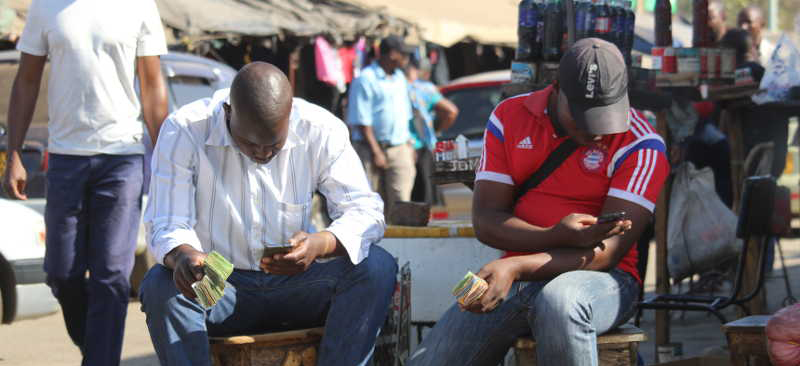INDUSTRIALISTS and retailers were sourcing at least 25 percent of their foreign currency requirements from the black market, a Confederation of Zimbabwe Industries (CZI)-organised breakfast meet heard yesterday.
Confederation of Zimbabwe Retailers president, Denford Mutashu, said retailers had resorted to sourcing foreign currency from the black market because of unavailability or limited supply of hard currency from the official market.
"The impact of the acute shortage of hard currency had started resulting in price increases in certain products, though sporadic, as importers and manufacturers had little choice but to pass on the cost of the currency premiums on to the customers who, he said, bore the brunt of the challenges," he said.
Cairns chief executive officer, Nancy Guzha, said most retailers were sourcing foreign currency on the parallel market because it was taking between six to eight weeks to receive their foreign currency allocations from banks.
Jimmy Psillos, an economic and banking committee chairperson for the CZI, said at least 25 percent of foreign currency required by industry and commerce was coming from the parallel market.
"At present, 25 percent or more of the goods in retail are dependent on informal foreign currency… People are worried because there are ingredients of inflation pressures. They are scared of what happened when the country experienced high inflation before dollarisation," said Psillos, who is also the managing director for Crystal Candy.
Psillos said some retail outlets were struggling to restock, while others were increasing prices on new stock, citing challenges in accessing foreign currency from the Reserve Bank of Zimbabwe (RBZ).
Zimbabwe is grappling with cash shortages that worsened during the second half of the year, with some banks unable to provide money at all to customers.
A shortage of US dollars has left businesses struggling to import goods and the raw materials to make products locally.
A foreign payments backlog was estimated at nearly US$600 million by mid September.
Government last week promulgated a law banning the trading of foreign currency on the black market, with penalties of up to 10 years for individuals convicted of participation in the illegal foreign currency market.
There are fears this may further fuel shortages, pushing black market rates higher and driving the illegal market underground.
RBZ governor, John Mangudya, said consumers should boycott retail outlets that unjustifiably increased prices.
"I was speaking to Mrs (Rosemary) Siyachitema (Consumer Council of Zimbabwe executive director) to encourage consumers to resist shops that increase prices. I was telling her to educate consumers to be active and stand for what is proper and right. The problem is Zimbabweans are too nice and just buy products knowing very well that they are overpriced," said Mangudya.
- fingaz
 Concern over Masvingo black market
Concern over Masvingo black market  Kenya declares three days of mourning for Mugabe
Kenya declares three days of mourning for Mugabe  UK's Boris Johnson quits over Brexit stretegy
UK's Boris Johnson quits over Brexit stretegy  SecZim licences VFEX
SecZim licences VFEX  Zimbabwe abandons debt relief initiative
Zimbabwe abandons debt relief initiative  European Investment Bank warms up to Zimbabwe
European Investment Bank warms up to Zimbabwe  Young Investment Professional (YIP) Graduate Programme 2019
Young Investment Professional (YIP) Graduate Programme 2019 











 Young Investment Professional (YIP) Graduate Programme 2019
Young Investment Professional (YIP) Graduate Programme 2019
Editor's Pick